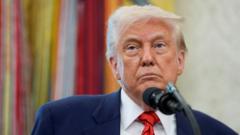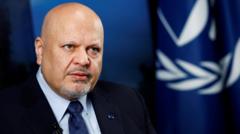In a bold diplomatic move, President Trump has embarked on a drive to reshape U.S. relations in the Middle East, stepping away from traditional alliances and endorsing Syrian leadership while dismissing Netanyahu's concerns.
Trump’s Diplomacy Shifts Focus from Israel to Broader Middle East Relations

Trump’s Diplomacy Shifts Focus from Israel to Broader Middle East Relations
President Trump’s recent Middle East tour illustrates a significant pivot in U.S. foreign policy, diminishing Israeli influence as he engages with Gulf nations and Syria.
When President Trump shook hands with Syria’s newly appointed leader during a high-profile visit to Saudi Arabia, it highlighted a noticeable shift in American diplomatic strategy in the Middle East. By agreeing to lift sanctions on Syria, Trump signaled a willingness to engage with a leader previously deemed a pariah in international dealings.
“This is a strong character, a strong past,” Trump said of President Ahmed al-Shara, who is linked with Al Qaeda. His assurance to end sanctions, primarily imposed on the former government, was part of a larger narrative where Trump appeared to downplay the objections of Israel's Prime Minister Benjamin Netanyahu, who has classified al-Shara as a threatening figure.
Traditionally, Israeli interests have held substantial sway over U.S. foreign policy in the region. Under previous administrations, Netanyahu's perspectives were often deemed critical. However, Trump's actions suggest a departure from this norm, as relationships with various Middle Eastern nations take precedence.
While there’s no signal that military or economic support for Israel will decrease, Trump insists that fostering ties with these countries is beneficial for Israel’s own standing. He expressed confidence in the new trajectory during his flight from Riyadh, reinforcing a vision where broader regional relationships could bolster Israeli security.
As the U.S. engages more with countries like Syria and others in the Gulf, the historical framework of its foreign policy seems poised for transformation, arguably sidelining a key ally in the process.





















